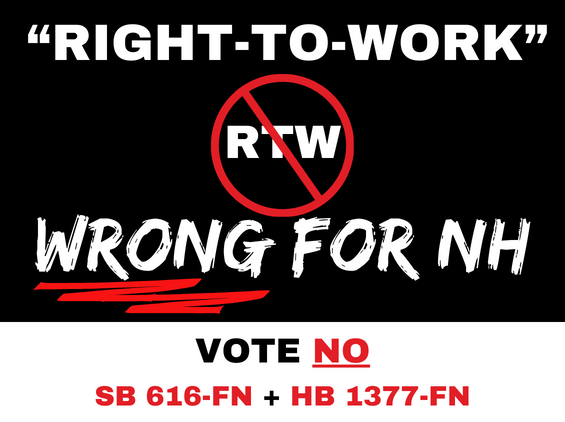A strong union needs skills, benefits and ACTION!

Op-Ed in the Union Leader: Marco Plante, of Genex Construction Group, Lance Mazzariello of Specialty Services of New England, LLC and David Anzalone of Advanced Exteriors and Glazing of New England call on elected officials to stand up for businesses like theirs and the workforce they employ by once again rejecting so-called “right-to-work” legislation in New Hampshire.
~~
AS DEDICATED building contractors and proud members of the New Hampshire business community, we are compelled to voice our opposition to the so-called “right-to-work” laws that make their way into the New Hampshire state legislative agenda time and time again. Despite the legislature’s wise rejection of these bills in the past, the debate continually resurfaces — a debate that is at odds with our state’s values and pushes policy that is both antiquated and out of touch with the demands of a 21st-century economy.
At first glance, “right-to-work” laws might seem like they’re in support of workers, a story politicians are quick to tell that misleads voters into thinking they’ll be good for business and the economy. But the truth is quite different. These laws, deliberately designed to make it harder for workers to negotiate with their employers for basic rights such as good working conditions and fair pay and benefits, undermine the relationship between employers and their employees.
“Right-to-work” laws essentially allow the government to interfere where it doesn’t belong, in a relationship that has been built on decades of negotiation and respect. If the last year has shown us anything, it’s that the strength of America’s workforce in advocating for basic rights is not just a passing trend; it’s a lasting force.
What’s more, the promises that have been painted by politicians about “right to work” don’t actually hold up when you look at how things have played out in places like West Virginia, which bought into the rhetoric. Just a few years ago, West Virginia Governor Jim Justice came clean about the letdown of “right to work” and confessed that businesses and workers didn’t rush into the state as promised. In his own words, “They didn’t come.”
Numerous studies have shown the negative impact of “right-to-work” laws on communities — playing out through lower wages, reduced health care coverage, and heightened rates of poverty that force many into a reliance on public assistance. It’s disappointing to see our lawmakers entertaining policies that worsen the struggles faced by working-class communities.
Here in New Hampshire, our collective companies play a crucial role in offering a significant number of jobs with living wages and benefits. Our partnership with the carpenters union allows us to deliver quality work by a highly skilled and trained workforce that not only sustains the livelihoods of individuals and families with rewarding careers, but cultivates a healthy and robust business community. These workers contribute to the strength and prosperity of our state’s economy.
Instead of getting stuck in dead-end debates about “right-to-work” laws, New Hampshire lawmakers need to focus on what actually makes a positive impact on our workforce. A good starting point is addressing the widespread issue of misclassification within the construction industry. According to a recent study by The Century Foundation, a staggering 18% of New Hampshire’s construction workforce is misclassified, resulting in a cost of more than $40 million to the state’s taxpayers. This groundbreaking study sheds light on the harsh reality faced by thousands of construction workers in New Hampshire — unscrupulous employers undermining rights and protections.
The connection between the issue of misclassification and the push for “right-to-work” legislation does not go unnoticed. One thing is clear, they both have no place in a state like New Hampshire.
We call on our elected officials to stand up for businesses like ours and the workforce we employ by once again rejecting “right-to-work” legislation. By doing so, we can collectively move our state towards a future that is defined by fairness, equity, and prosperity.